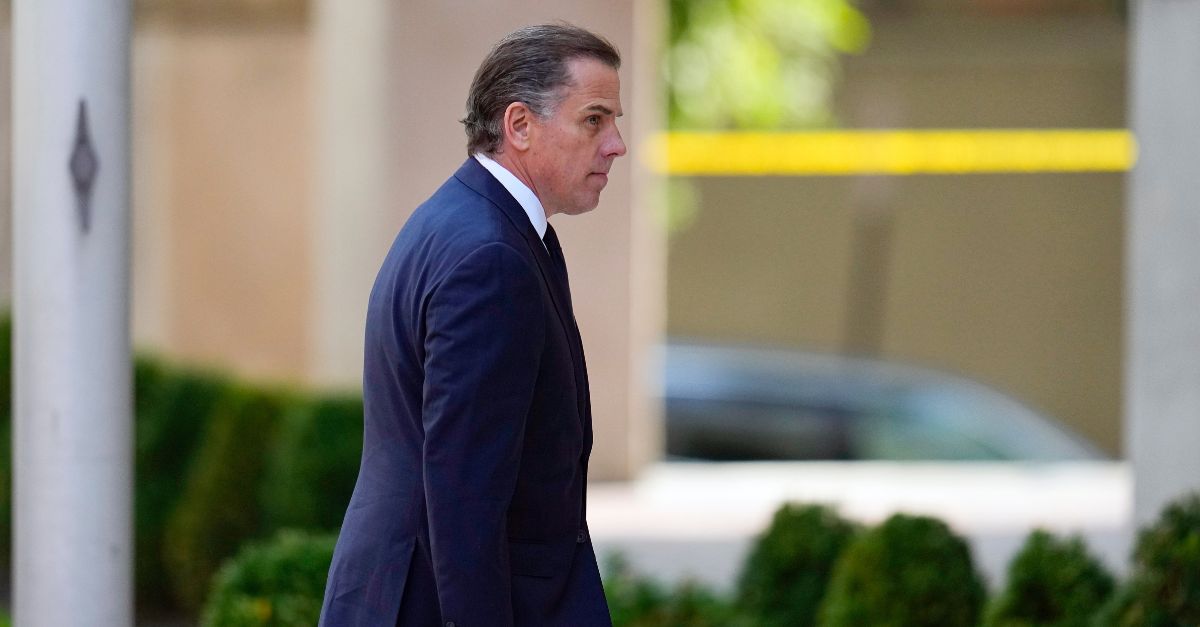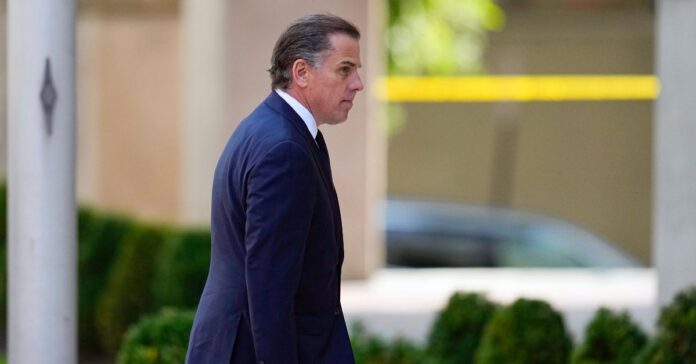
President Joe Biden’s son Hunter Biden arrives for a court appearance, Wednesday, July 26, 2023, in Wilmington, Del. (AP Photo/Julio Cortez)
The IRS has responded to Hunter Biden’s lawsuit by asking a federal judge to partially dismiss one count and to dismiss a Privacy Act violation count “in its entirety,” writing that President Joe Biden’s son failed to show the agency’s alleged lack of “safeguards” to prevent two whistleblowers and their attorneys from disclosing his “confidential tax return information” in media interviews caused him to suffer “actual damages.”
The government began by arguing that count 1 — willful or grossly negligent unauthorized disclosure — should be dismissed insofar as it attempts to hold Gary Shapley and Joseph Ziegler’s attorneys accountable. Why? Because the lawyers aren’t officers or employees of the United States.
“The United States is immune from suit unless it has explicitly waived its immunity,” the government wrote, noting such a waiver of sovereign immunity would “only” occur “if the disclosures were made by an ‘officer or employee of the United States.”” The IRS said, however, that Hunter Biden “may seek redress against” the attorneys under I.R.C. § 7431(a)(2) — the part of a civil damages statute dealing with unauthorized disclosures of tax info by non-governmental actors [see also: 26 U.S. Code § 6103(a)(3)].
“The United States has not waived its sovereign immunity for the alleged wrongful disclosures made by IRS employees’ personal attorneys,” the government stated.
The government further argued that count 2, Biden’s Privacy Act violation claim based in the IRS’ alleged failure to “maintain adequate safeguards” against unauthorized disclosures, should be completely thrown out of court because “neither § 7431 nor the Privacy Act provides for the type of extraordinary relief he seeks,” particularly an injunction.
Rather, Biden must plead — but did not — that the IRS’ alleged lack of “safeguards” caused him “tangible pecuniary harm,” the government said.
“Here, although Plaintiff seeks a monetary award under § 552(g)(1)(D) and (g)(4) […] he fails to plead facts showing that he has sustained any calculable monetary loss as a result of the IRS’s alleged conduct,” the motion said, continuing as follows [citations removed for ease of reading]:
Plaintiff states that he has suffered “staggering” harm “reputationally and emotionally.” But Cooper expressly instructs there is no waiver of sovereign immunity under the Privacy Act for those types of alleged injuries. And otherwise, Plaintiff’s Amended Complaint provides only the barest of allegation that he “will continue to sustain damages directly traceable to the IRS’s violation.” That is a far cry from “specially pleaded” allegations of actual pecuniary loss.
The filing noted that Biden “must also plead and prove facts showing ‘that the agency acted in a manner which was intentional or willful’ and that, as a result, the plaintiff suffered ‘actual damages.’”
Due to the lack of “actual damages” proof and a failure to “clear the high hurdle of setting forth an intentional or willful violation of the Privacy Act,” the second count should be dismissed “in its entirety,” the IRS asserted.
Last September, Hunter Biden sued the IRS, alleging that agency employees Shapley and Ziegler “completely disregarded their confidentiality obligations” in order to “publicly smear” him by making “unauthorized” disclosures of tax return information to the media, which Biden called an “assault” on his privacy rights.
The initial version of the lawsuit came months after Shapley and Ziegler publicly testified before Congress, claiming that “unethical slow-walking and preferential treatment” and “deviations from the normal investigative process” prevented felony tax evasion and “fraud or false statements” charges connected to Hunter Biden’s business dealings with the Ukrainian gas company Burisma.
Then, in early February, Biden filed an amended complaint in the case (see here for the redlined version).
Between then and now, the feds charged Alexander Smirnov, a former FBI informant with possible ties to Russian intelligence, for allegedly fabricating claims that Hunter and Joe Biden were bribed by Burisma executives while the latter was vice president of the United States.
The Hunter Biden lawsuit was assigned to U.S. District Judge Timothy Kelly, a Donald Trump employee, when the case was first filed.
Read the IRS motion here.
Have a tip we should know? [email protected]

